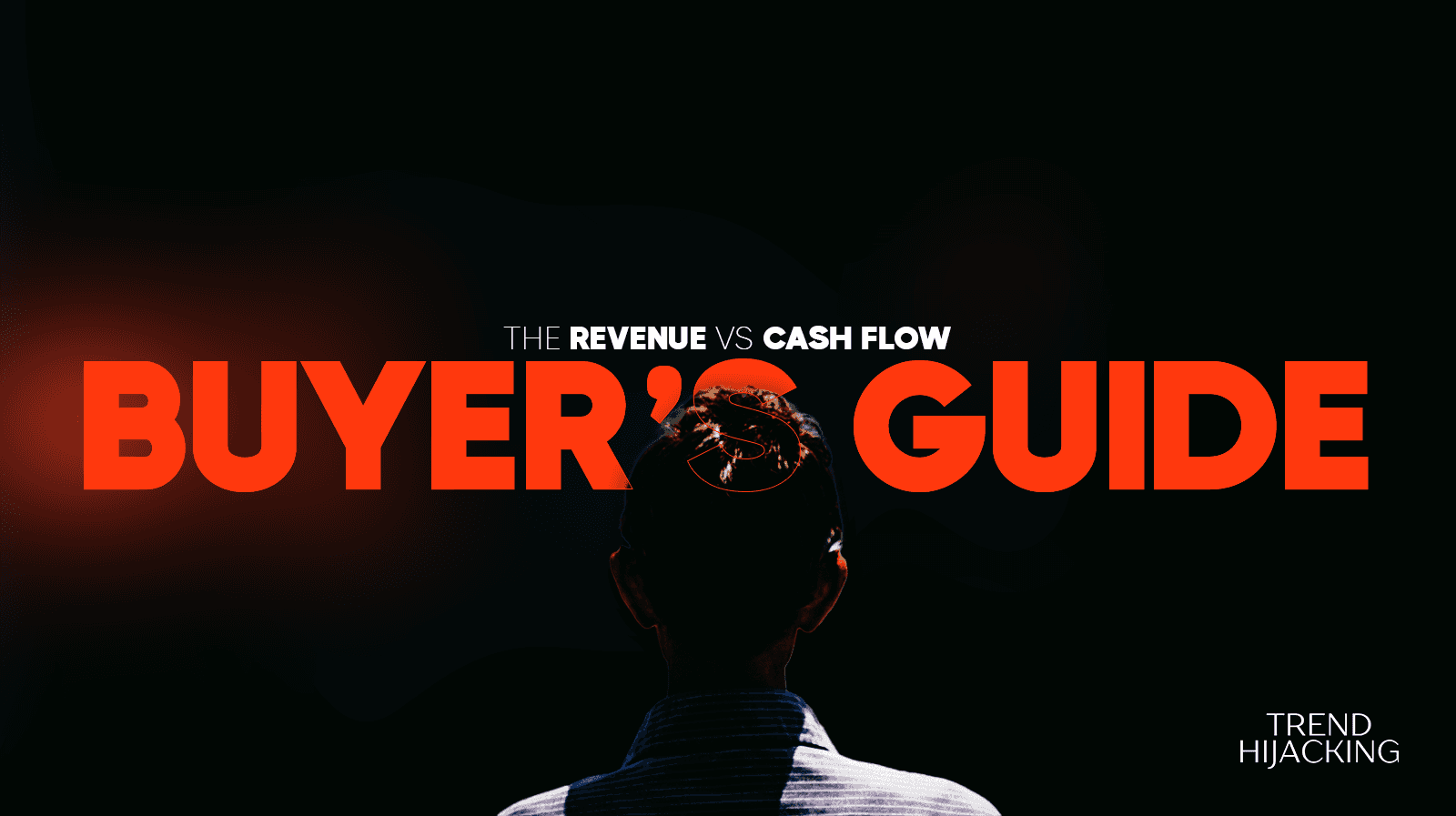
7 Must-Ask Questions When Buying An E-commerce Business
Buying an existing e-commerce business is one of the smartest moves you can make today as an entrepreneur or investor.
Instead of starting from scratch, you get a business that’s already generating revenue, has real customers, and has been proven to work.
That’s a HUGE win—especially in a world where many e-commerce startups fail within their first year, and most don’t survive past five.
However, the real struggle comes in finding the right business to buy.
You want something profitable with solid revenue, but also something with real growth potential and a smooth handover.
And with so many shady listings and overpriced duds on marketplaces today, getting the perfect acquisition only gets harder.
So, how do you find a business that’s actually worth your money?
It starts with asking the right questions:
The seller knows their business inside out. So, if you want to understand its true potential (or spot red flags), they’re the one to ask.
In this article, we’ll walk you through 7 MUST-ask questions to help you make a smart, informed decision when buying your next e-commerce business.
1. Can You Show Me Monthly Revenue And Expense Reports For The Past Two Years?

Proof is always in the numbers. So the first thing you want to do is see what the real numbers look like.
Ask the e-commerce business seller for full reports that list what came in and what went out each month.
Ideally, you want to see gross sales, all costs, and net profit for at least twenty-four months.
Look for steady growth or clear reasons for any dips.
If you notice profits bouncing by 30% month to month (with no clear explanation), then the business may be facing some hidden issues.
While a steady drop for seasonal ecommerce businesses (e.g., a store that sells winter clothes), unexplained swings should alert you to take a deeper look.
You also need to know about debts. Ask for a balance sheet that shows loans, unpaid bills, or pending invoices.
A clean sheet means you’ll be taking on less risk.
Related: 27 Key Financial Questions to Ask When Buying A Business
We Help You Buy / Build, Manage and Scale E-commerce Brands for an EXIT
E-commerce Simplified for Busy Individuals – We handle the buying, building, and scaling, so you can focus on what matters.
Growth-Focused Strategies – From sourcing to marketing, we drive growth and prepare you for a profitable exit.
Expertly Managed Exits – We build a high-value brand designed for a Lucrative exit.
2. What Share Of Traffic Is Organic, Paid, Or From Social Media?

A steady stream of visitors is the lifeblood of any online shop.
You should therefore ask the seller to give you access to Google Analytics or similar data for the past year.
You want to see how many people visit the store organically, how many come from ads, and how many click in from social media posts.
A site that heavily depends on one ad channel can face trouble if ad costs spike.
Digital ad prices have climbed significantly, making ads a bigger part of costs.
You must decide early enough if you can afford to keep paying those rates.
Also, ask the seller about the visitor quality. High traffic is good, but low sales from those visits can spell trouble.
Ask for click-through rates, bounce rates, and average time on site. This will help you see if visitors find what they want.
Related: How To Verify Traffic Sources When Buying an E-commerce Business
3. What Are The Net Profits After All Fees, Taxes, And Ad Costs?

Gross sales matter, but real cash in hand is what counts.
Ask the seller to break down costs for payment processing, ad spend, platform fees, shipping, and taxes.
This way, you’ll get to see the true profit per order.
Imagine two stores, both selling $100,000 a month.
One keeps $20,000 after all costs.
The other keeps $5,000.
Which would you pick?
You need those numbers laid out!
PRO TIP: Work with your accountant to verify the math. Mistakes in tax filings or hidden fees can change the picture fast.
Related: E-Commerce Profit Margins: What’s A Good Store Profit?
4. Who Handles Product Sourcing And Shipping, And What Are The Current Costs?

An e-commerce business is more than any other website. It is a supply chain.
Ask how the seller finds products, what their supplier deals look like, and who packs and ships orders.
You want to see supplier contracts and invoices. You need to know any minimum orders or price-lock terms.
Ask if they get any volume discounts.
Next, you should enquire about shipping. Ask for the average cost per order.
If the seller locked in rates with a carrier, that can save you money.
If they handle shipping in a garage, you may need to hire help.
Don’t forget to check inventory levels. Ask, “What is the value of stock on hand?” and “How often do items go out of stock?”
Running out of hot items can kill your business sales fast.
5. Have You Had Any Customer Complaints, Chargebacks, Or Legal Issues?

You’ll also need to know whether there exists any trouble with customers or the law.
Ask the business owner if any buyers filed complaints, returned goods en masse, or started chargebacks.
If such cases exist, ask for records of those issues and how the seller fixed them.
Next, you want to enquire about the trademarks and copyrights.
Ask if anyone has challenged the product names, logos, or images.
You want written proof that the seller owns or is licensed to use all content.
Finally, look into the data privacy.
Ask for the privacy policy and terms of service.
Make sure they match current law in the US, EU, or anywhere the store sells.
A wrong clause can trigger fines or block your access to ad networks.
Ask this: “Have you filed and paid all required sales taxes in each state or country?”
Missing taxes can mean a big bill for you after closing.
Related: Do You Need A License To Run A Shopify Store?
We Help You Buy / Build, Manage and Scale E-commerce Brands for an EXIT
E-commerce Simplified for Busy Individuals – We handle the buying, building, and scaling, so you can focus on what matters.
Growth-Focused Strategies – From sourcing to marketing, we drive growth and prepare you for a profitable exit.
Expertly Managed Exits – We build a high-value brand designed for a Lucrative exit.
6. Why Are You Selling The Business Now, And What Will You Teach Me?

You need to know the seller’s motive. Ask them: “Why are you selling?”
Honest answers can show real reasons;
Maybe they want more free time.
Maybe they face market limits.
Next, you should ask them about the hand-off. “What daily tasks will I take over?” and “How much training will you provide?”
A clear plan for at least 90 days will help you step in without panic.
Also ask, “Will you sign a noncompete?”
You want the seller to stay out of direct competition for a set time. This helps protect the value you just bought.
7. What New Products Or Markets Have You Tried, And What Risks Lie Ahead?

You MUST also see the road ahead from the current owner’s perspective.
Ask them about any test products or new customer groups the seller tried.
Ask: “What worked, and what failed?”
This should tell you where you can push growth.
Also, ask about threats: “What risks could harm sales in the next year?” Maybe a supplier raised prices. Maybe a new competitor is grabbing market share.
Clear answers help you build a plan.
If the seller warns of rising costs, you can negotiate a lower price or lock in rates ahead of time.
If they see new markets that are underserved, you can target them fast.
Putting It Into Action
You will need more than a good feeling to buy an online shop. You need facts. For this reason, we strongly suggest that you ask clear questions about money, traffic, profit, operations, legal, motives, and growth. Use these direct questions as your guide. They will help you spot strengths and weak spots. You will step into the deal with your eyes wide open.
Sometimes, the whole e-commerce due diligence process can feel overwhelming, especially if you’re new to this or simply don’t have time to dig deep.
That’s where we come in. Our expert team handles everything for you: finding great deals, doing thorough checks, negotiating terms, and closing the sale. After acquisition, we help you manage and grow your store using proven strategies to increase its value by 2–4x, setting you up for maximum profit when you're ready to sell.
Let’s get you started: book a discovery call with us and let’s find your perfect store.
A Done-For-You E-commerce Business
Discover how we Build, Launch, and Scale a 6-figure/month Business for You
Learn more
The 6-Step Blueprint to E-Commerce Acquisition
See how we Acquire, Convert, and Scale with Real Case Studies to Prove It.



















